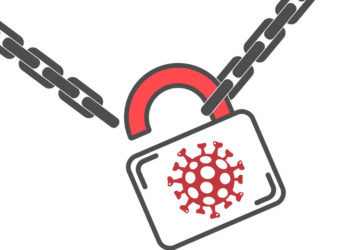Editor’s Note: Today’s post is by Leigh-Ann Butler, Shannon Cobb, and Michael Donaldson. Leigh-Ann is a Policy Analyst at the Natural Sciences and Engineering Research Council of Canada (NSERC). Shannon is a Science Policy Advisor at the Canadian Institutes of Health Research (CIHR) and was formerly a Policy Analyst with NSERC. Michael is an Open Access Specialist with Canadian Science Publishing, and an Adjunct Professor in the Department of Biology at Carleton University.
As mentioned in Part 1 of this series, the COVID-19 pandemic has exposed a number of (existing and new) barriers to open scholarship, and has highlighted many new challenges. However, the pandemic also presents new opportunities for creating equitable openness and greater access to research.
Global efforts to increase Open Access (OA) during the COVID-19 pandemic affirm that a closed publishing system continues to dominate the research ecosystem, despite the 17 years since the launch of the Budapest Open Access Initiative, the Bethesda Statement on Open Access Publishing and the Berlin Declaration on Open Access to Knowledge in the Sciences and Humanities.
This year, the majority of scholarly publishers implemented temporary measures like removing paywalls to make COVID-19-related articles and data openly accessible and reusable, and participated in other initiatives to rapidly disseminate research results. However, lessons from past pandemics demonstrate that research production and access need to continue after an outbreak has ended.
In the second of our two part series on how COVID-19 is changing open access in Canada, we examine changes in three key areas of the publication process — the pre-publication stage (preprints and article peer review), funding, and infrastructure (discovery and metadata) — and how Canadian initiatives are helping to make research more open.

Pre-publication: preprints and article peer review during COVID-19
Preprints can serve as a complement to traditional scholarly publications. The production and sharing of preprints has surged this year, in response to COVID-19. Prior momentum and advocacy efforts to promote preprints may have contributed to this increase; however, the global urgency of the pandemic has resulted in exponential demands for faster access to scientific information, which preprints offer. COVID-19 preprints have accelerated access to research findings by bypassing the traditional peer review process and timelines and by collecting feedback from a wider net of scholars who share their findings on social media platforms, such as Twitter. The rise of preprints during COVID-19 presents a new practice of sharing early research results and the next steps are to consider the lessons learned and determine what could work best moving forward (accounting for potential disciplinary differences).
In her keynote address at the 2020 Canadian Research Knowledge Network Conference, Canada’s Chief Science Advisor Dr. Mona Nemer noted that preprints and open data during COVID-19 have “put the science process out in the open…which puts an onus on the community to explain how consensus is built among scientists and how science knowledge is produced”. Nemer explained that two aspects of open science — the transparency of preprints and open data — “fosters quality and integrity in research by offering an opportunity for wider evaluation and scrutiny. Preprints and the open sharing of data is accelerating knowledge development.”
COVID-19 has exposed bottlenecks within the journal peer review process. Monica Granados is a Canadian researcher involved in PREreview, an open-source and free platform designed to engage the whole scientific community with collaborative and constructive peer review on preprints. Granados remarks that the increase in manuscript submissions during COVID-19 has “enlarged the gap between the number of reviewers available and the number of review requests. As with so many of our systems, COVID-19 exposed this deficiency in the scholarly communication process.”
In response, the scholarly community has developed initiatives to more quickly facilitate access to the science. Granados highlights one such initiative initially developed as a response to Zika and Ebola outbreaks: Rapid PREreview, jointly developed by PREreview and Outbreak Science. “This platform facilitates fast, efficient reviews of COVID-19 relevant preprints, including those relevant to COVID-19.” Granados adds that the group continues to work with other organizations “to establish workflows between rapid reviews of preprints to the journal-organized peer review.” Such community actions demonstrate how to move OA forward and facilitate access during COVID-19.
Conversations continue about improving the peer review process and editorial quality, and the idea of article peer review being a guarantee of validity.
Dr. David Moher, Senior Scientist, Clinical Epidemiology Program at the Ottawa Hospital Research Institute, and Director of the Centre for Journalology, comments on preprint and article retractions during COVID-19:
“In a rush to provide relevant knowledge to their readers, even the top echelon journals have been bruised or worse. There has been an unfortunate number and steep trajectory of article retractions causing bodily harm to authors, peer reviewers, journals and publishers. Patients and the public looking for trusted sources have been undermined. However, not all is lost. In at least one instance a journal [The Lancet] has reflected on their peer review and editorial practices and invoked more sensible peer review practices to minimize the further potential of retractions.”
In addition to statistical peer review, The Lancet now requires that editors obtain a review from a data science expert for articles with large, public datasets. Reviewers are also explicitly asked if they have concerns about research integrity or publication ethics regarding the manuscript they review.
Do workflow changes that move the point of feedback earlier upstream, like the Lancet example, help catch errors before publication? Possibly, but an argument could also be made that a more open scientific process which encourages researchers to show their work, such as open data and peer review, can also move the point of feedback before “bad science” is published.
Initiatives like PREreview and Outbreak Science Rapid PREreview show how the scholarly communication system has the ability to make effective changes during a crisis. The question remains of whether or not these trends are sustainable post-pandemic and more work needs to be done in open science to ensure quality control in the race towards publication in a crisis situation.
Stefanie Haustein, Associate Professor at the University of Ottawa’s School of Information Studies and co-director of the ScholCommLab, remarks that “the rapid sharing of preprints and OA publishing, as well as data sharing, have become an imperative for those conducting research to fight a global pandemic. Canada followed global calls that COVID-19 research outputs should be shared ‘rapidly and openly to inform the public health response and help save lives.’ It remains to be seen to what extent authors will comply with these policies.” Haustein raises the point that policies and initiatives need compliance to work. A future step is to re-evaluate how these new measures function within the overall system to respond to the next health crisis.
Financial impacts of COVID-19 on OA
Financial stability is an essential piece of the scholarly lifecycle, including support for open access. Pre-COVID-19, academic institutions and their libraries faced budget constraints, which have been further exacerbated by the pandemic. Canadian universities could see additional investment reductions from governments and industry, adding to the pressures facing institutions and prolonging their financial recovery. This strain, may, in turn, result in additional budgetary cuts to post-secondary institutions’ libraries, whose holdings, infrastructure, and support ensure that researchers have access to critical research.
Susan Haigh, Executive Director of the Canadian Association of Research Libraries (CARL) explains that “many Canadian research libraries are anticipating budget cuts as a direct or indirect result of the pandemic’s impact on their universities. And yet, to support online courses and to offset the closure of access to their physical collections, they have had to support an abrupt and significant rise in their spending on electronic learning resources. For example, a member diverted about 4% of their budget to new e-book packages and streaming videos. That percentage might not sound like much, but it represents almost all their discretionary collections spend, it meant they stopped purchasing print entirely, and all their salary savings were converted to extra electronic resource purchases.”
Haigh’s comments demonstrate the academic community’s financial vulnerabilities, which depend on funding to drive the mission of accessible research. At the federal level, Canada’s granting agencies (NSERC, SSHRC and CIHR) delivered rapid research funding to bolster Canada’s response to the COVID-19 outbreak, in addition to the agencies’ regular and ongoing funding investments in Canadian research. Researchers receiving COVID-19 funding from NSERC are encouraged to make all scientific information related to COVID-19 immediately open access. NSERC also calls on researchers to consider doing the same for all COVID 19-relevant scientific information, irrespective of how it is funded. Haigh comments that there may possibly be additional long-term effects on the budgets of academic institutions post-COVID-19. Since libraries are a vital support system for research, future budget cuts will have a ripple effect on open access/scholarly publishing and journal subscriptions.
Clare Appavoo, Executive Director of the Canadian Research Knowledge Network (CRKN) — the national collective negotiating body for academic libraries in Canada, adds, “Through our member-driven negotiation objectives, CRKN is in a unique position to act at the national level to increase access to research content published both by not-for-profit, and commercial publishers. At the beginning of the COVID-19 crisis, we formally requested financial relief from the vendors with whom we negotiate. Our 2020 negotiations were in direct response to the budgetary challenges experienced by members and driven by our licensing principles. In alignment with the research community and our Stakeholder Alignment Group we also launched our first national transformative agreement with SAGE, which increases open access options for Canadian researchers.”
Discovery, infrastructure, and metadata
Digital infrastructure is key to linking together the scientific community, and making research accessible, readable, shareable and available for reuse. Pre-COVID-19, tools like PKP’s Open Journal Systems and Coalition Publica generated discussions in the research community about the importance of community-led infrastructure in the increasingly oligopolistic space of globalized for-profit publishing. COVID-19 has shone a light on the value of accessible infrastructure for all communities.
Kathleen Shearer, Executive Director of the Confederation of Open Access Repositories (COAR), touches on the need for sustainable infrastructure to support the success of open science practices.
“To expand and extend open science practices beyond the COVID-19 pandemic, we need to incentivize openness through reforming research evaluation systems (that often rely on very narrow metrics) and redirect funding towards open services and infrastructures. We also need to achieve a better balance between international interoperability and supporting diversity and equity in open science (e.g., the draft UNESCO Recommendation on Open Science and France’s Second National Plan for Open Science).”
Shearer addresses an important question: what does sustainability look like when the push to extinguish a global crisis is gone? Beyond systems, detailed metadata and persistent identifiers (PIDs) play a valuable role in research discovery. Haigh comments that the urgency of the COVID-19 pandemic highlights the need for standardized and comprehensive metadata and PIDs, “for researchers, their research publications and datasets, as well as their institutions and funders.” To ensure that the Canadian community can again benefit from the increased interoperability and discoverability of PIDs, both ORCID and DataCite have national Canadian consortiums, ORCID-CA and the DataCite Canada Consortium. These national consortia are community-lead and include a joint advisory committee that is supported by both CRKN and CARL. Haigh also shares that CARL has been working on a project to develop new workflows that will “allow the community to enhance existing metadata and ensure that Canadian COVID-19-related research is discoverable in Canada and internationally.”
COVID-19 is highlighting how an open-by-default system could more nimbly respond to crises. Organizations, like those that Shearer, Appavoo, and Haigh represent, demonstrate the community efforts to mobilize knowledge and implement greater OA long-term. The initiatives and perspectives presented in this post demonstrate the longstanding value of OA, especially during times of crisis. As Haustein notes, “now is the time to ask why these principles [of openness] should only be relevant in the context of pandemics and global health threats. Why not apply open scholarship to climate change, sustainability and other pressing societal issues? Why not to any field of research and scholarship?”.
We have only skimmed the surface of the numerous impacts COVID-19 is having on OA, in Canada and around the world. Another pressing issue the pandemic highlights is the value of science communication, and ways to equip society with the tools to critically understand science. As Dr. Alejandro Adem, President of NSERC, stated in his 2020 opinion piece in The Ottawa Citizen, “Let’s leverage this mass science lesson to foster a broad-based culture of science literacy. If one legacy of COVID-19 is a nation where people feel better informed and more capable of grasping scientific issues, we’ll be in a stronger position to thrive in the post-pandemic world.”
The unprecedented nature of the pandemic and the urgency for research to solve the crisis require communities around the world to mobilize, collaborate and share their knowledge. Canadian experts are sharing their perspectives and ideas for change. Going forward, the advancement of OA requires global cooperation and investments among the network of players.
We realize there are many more ideas and actions that can be proposed to advance OA, and we invite the global scholarly community to share and action them together. Some questions to get us started…
- Is immediate OA sustainable post-COVID, and scalable to other research areas?
- How can we increase global collaboration, particularly with the Global South, to unify and tackle barriers to knowledge production, access and sharing?
- Previous pandemics have highlighted the need for OA, but we have not implemented long-term and sustainable actions. What can we do differently to prepare for the next pandemic(s)?
- Has COVID-19 created issues of trust in scholarly publishing (i.e., predatory publishing, conflicting evidence, article retractions)?
- Have the changes to scholarly publishing during COVID-19 resulted in new ways of sharing knowledge that were not previously considered, and that could become the “new normal” post-pandemic?
Discussion
3 Thoughts on "Guest Post — Pandemic Disruptor: Canadian Perspectives on how COVID-19 is Changing Open Access in Canada (Part 2)"
Interesting pair of articles and, conciseness being generally a virtue, the terminology “preprints” rather than “preprint publications” (i.e. made public, as the NIH paper preprint publications in the 1960s were not), is acceptable. However, here the title – “Pre-publication: preprints and article peer review during COVID-19” – implies that preprint publications are not really publications. They are “pre-publication ” and merely “serve as a complement.”
Thanks so much! I’d love to read more Canadian insights on this site on a daily basis.
Loved the question: “Has COVID-19 created issues of trust in scholarly publishing (i.e., predatory publishing, conflicting evidence, article retractions)?”
I think that the biggest problem is that the public trusts too easily, all that they read. It is imperative that we do not immediately trust every written word. The deluge of articles during the pandemic has made us realize that we should get things validated from multiple sources before jumping onto conclusions after reading any random publication. Also, as far as retractions are considered- one should normalize them, it shouldn’t be a taboo- give people opportunity to correct their observations. Science evolves, there are no absolute answers. Of course a lot of these retractions are a result of ethical malpractice- and that is not correct. But, honest mistakes should be given a chance to be corrected- that is how research grows!



